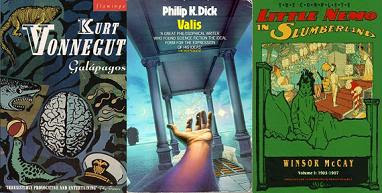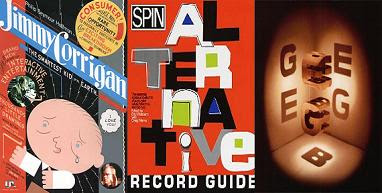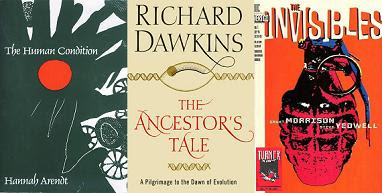Here's what I came up with...
[Title links go to most relevant review/article available.
Authors link to official site, or whatever I could find.]

1. Galapagos - Kurt Vonnegut (1985)
The first Vonnegut I read, back at 16 or 17 - and still probably my favorite. Vonnegut became my go-to author at some point, and 20+ years later, he seems like an old friend or a cool uncle. This one has a perfect cast of defective characters, with a message that we are only what's in our genes. Especially when random disasters strike, and the future of humanity boils down to a shipwrecked and haunted cruiseliner. The root of my interest in popular science, specifically evolutionary theory.
2. VALIS - Philip K. Dick (1981)
The magnum opus of all psycho-religious meta-fictional auto-biographies. Unlike the rest of Dick's impressive body of science fiction, the author plays two parts (both himself) winding through his own memories of paranoid freakdom in '70s California, and of early-Christian paranoia in the 1st century Roman Empire. The gnosis beamed from an alien satellite drives Horselover Fat to process itself via compulsive graphomania, and he meets a child messiah through some psychedelic exploitation film-makers.
3. Little Nemo: 1905-1914 - Winsor McCay (2000)
The art is simply amazing, more amazing that it was produced on a weekly schedule, and more amazing still that it was printed full-page in newspapers around the country for a decade! The adventures in Slumberland progressed from strip to strip, each of which ended the same way - with Nemo awaking to his parents' annoyance at his boistrous sleep patterns. The art is huge, super-detailed and impressionistic, concrete images drowned in surrealism. With a little boy in pajamas running amok within (and with) the environment, everyone speaking in the most cramped speech balloons imaginable.

4. Jimmy Corrigan: The Smartest Kid on Earth - Chris Ware (2000)
One of the most beautifully designed and brutally sad comic stories around, collected from the Acme Novelty Library series. Three generations of James Corrigans live extremely human lives, full of disappointments, mistakes, and regrets. There are moments of sweetness too, but they always fade away (or self-destruct). The baroque turn-of-the-century-design style, newspaper-strip-abstract characters, and idiosyncratic obsessive-compulsive diagramming, all create a completely unique and affecting book.
5. The SPIN Alternative Record Guide - SPIN magazine (1995)
This book (now OOP) lead me down a number of paths I would otherwise have missed (or at least been delayed finding): Big Star, Have Moicy!, John Fahey, Nick Drake, and specific albums (post-Tago Mago Can, Eno-era Bowie). Despite lots of errors, it's a good reference book - fun to flip through and find something new or familiar. As always with Spin, Byron Coley's writing sticks out like a broken thumb caught in a peepshow coin-return slot.
6. Gödel, Escher, Bach: An Eternal Golden Braid - Douglas R. Hofstadter (1979)
What a weird book. You can breeze through some of the conceptual stuff, even when it's talking about the nature of human intelligence, conscious thought, and self-awareness. M.C. Escher and Alice In Wonderland are familiar enough to handle. Then you hit Bach's "The Art of Fugue" and "The Musical Offering," which is somewhat comprehensible... Then you're straight into set theory and Gödel's Incompleteness Theorem and higher theoretical math - and it's time to start the last chapter over. Despite (or maybe because of) the occasional difficulty, the process itself is thought-provoking, which makes you think about whether the difficulty is intentionally provoking thoughts about the thought-provoking difficulty, then you realize you're stuck in a reflexive cascade of self-referential loops. Which is like the core theme of the book.

7. The Human Condition - Hannah Arendt (1958)
When I was trying to become a scholar, studying individual political action, this was all new to me. Getting through the dry, academic language of political theory, it breaks down to a whole book about how (and why) we do what we do defines politics and our humanity. The Labor-Work-Action ladder has always stuck with me. Also, Arendt was "a hip, hip lady" - leaving Martin Heidegger behind in Nazi Germany, hanging with Mary McCarthy's crowd, covering Adolph Eichmann's trial, coining the concept of "the banality of evil," and being an all-around intellectual icon.
8. The Ancestor's Tale: A Pilgrimage to the Dawn of Evolution - Richard Dawkins (2004)
More science-y than The God Delusion, more action-packed than The Selfish Gene, this passes on stories using an oral-tradition-as-genetic-evolution metaphor. As we roll on back our evolutionary family tree, we meet our ancestor species and hear their stories, which illustrate different concepts of Darwinian evolution (natural selection, genetic processes, descent with modification). Things move briskly enough to make learning fun! Well, if you like the science readin'...
9. The Invisibles series - Grant Morrison/various (1994-2000)
There's a war going on, behind the scenes, and our universe is the front line. Technically, our physical universe is a manifestation of the intersection between two opposing realms - the Invisible College (committed to liberation and individuality) and the Outer Church (archons of enslavement and conformity). Of course to win, it will takes a freedom fighter/terrorist cell of: a mystical fetish spy-assassin, a female cop from Bed-Stuy, a Brazilian transvestite brujera, a psych-ward patient from a possibly-fictitious future, and a high-school punk who's probably the Buddha for the current age. Conspiracies are true, your irrational fears are justified, everybody is in on it, but no-one knows. BARBELiTH
10. The Turner Diaries - some nutjob bigot, 1978 (Don't go here!)
I thought I understood the ugliness of what racists thought. Man, was I ever underestimating them! Some of the most cliched prejudices are expanded to ludicrous extremes. New fears and hatreds are unearthed. And some of the most ham-fisted writing ever is committed to beatiful, pure, white, glorious, blank paper. Ruining it forever with disgusting black ink words, and creating a mud paper of mixed-up ideas and scary-crazy bitterness and rage.
 And the final five:
And the final five:11. Outside the Dog Museum - Jonathan Carroll (1991)
Like the pulp magical-realism author, the more digestible Gabriel Garcia Marquez - I like most of his books about the same. This one for personal reasons.
12. If on a winter's night a traveler - Italo Calvino (1979)
The most fun you can have with experimental fiction. (They're all Chapter 1's!) I like some of his other books better, but this is where it all starts.
13. Travels in Hyperreality - Umberto Eco (1995)
Not tied down to a narrative and formalism gambits, Eco lets loose with tons of crazy ideas - mixing up comic book superheroes, the Middle Ages, universal myths, modern technologies, and drags all his obsessions to one syncretic party.
14. The Dreams Our Stuff Is Made Of: How Science Fiction Conquered the World - Thomas M. Disch (1999)
Lots of concepts here too, about how so many modern ideas take root in and are influenced by science fiction before being exported to reality. Goes well beyond "Arthur C. Clarke invented the geosynchronous communications satellite."
15. From Hell - Alan Moore/Eddie Campbell (1999)
Staggering in its vision, scope, and depth. The research! The footnotes!! Jack the Ripper executing ceremonial sacrifices - on royal orders - to bring about the modern age? Or something... It's so obvious! Plus, he solves the Ripper's identity - maybe...

No comments:
Post a Comment